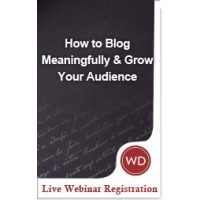What Should Authors Blog About?

Wesley Fryer / via Flickr
Note from Jane: Tomorrow, I’m offering a 90-minute live online class on how to effectively blog, in partnership with Writer’s Digest. Find out more and register.
The chain of events goes something like this:
An author’s book nears its publication date (or perhaps the author is attempting to secure a traditional book deal). She knows she needs to market and promote the book and/or build a platform.
She finds (or hears) advice that blogging is a good way to accomplish #1.
She wonders: What do I blog about?
My unproven theory: We have many authors blogging poorly because of this series of events.
It’s not dissimilar to authors ending up on Twitter or creating a Facebook page that ultimately fails to engage readers or sell books.
But then why do we hear all the time that these are good marketing practices?
Because it’s true that blogging is a very effective marketing tool, when done well. I started blogging (in 2008) because it seemed like a fun creative outlet—a practice that would build discipline and better engagement with my community. Nearly 7 years later, blogging acts as the core of my platform and has largely made it possible for me to be a full-time entrepreneur.
So I’m not down on blogging, at least for myself. But I was willing to put in 7 years of effort, and I also improved as I went along. My best blog posts didn’t start appearing until roughly 2011-2012.
You can be a quicker study that I was and be a lot more strategic. (See Chris Guillebeau for an example and excellent how-to guide.) Unfortunately, many authors pursue blogging without any understanding of the medium, and also as little more than a means to an end.
Meaningful blogging requires patience and persistence, as well as a willingness to learn what comprises good, compelling online-driven or online-only writing. It’s not the same as writing for formal publication or in other genres/mediums—or even for websites other than your own.
I’m writing this long preface in response to the question “What do I blog about?” because the first answer may be: If you have to ask, maybe you shouldn’t be blogging. In that, my position is somewhat stubbornly Zen: if the action is too forced or contrived, the blog may be doomed from the start. Or you may not stick with it.
On the other hand, I want to encourage experimentation. If you can approach this because it kind of does sound like fun, then let’s spark your imagination as to what you might blog about.
Here are several models to consider, based on how challenging I think they are (assuming you want your blog to “pay off”).
Easy: The Literary Citizenship Model
If you’re not familiar with literary citizenship, you can read more about my views on it here. It basically means celebrating and bringing attention to authors, writing, and books—the things you presumably love and want to support.
Blogging with the intent to promote literary citizenship opens up a lot of post possibilities, including:
Informal book recommendations or reviews
Q&As or interviews with people in the community (usually authors)
“What I’m Reading Now” types of posts and other “media consumption” lists where you talk about what stuff you’re watching, saving, listening to, collecting, etc.
Key benefits: You’re building a great network of contacts as you build some excellent content at your site. Every author loves to get attention (or find a new fan) for their work.
Where the difficulty lies: Lots of literary citizenship activity exists online, in many forms. To get a large readership will require a unique angle or spin—although this is true of any blogging effort.
Easy-Medium: How-to Model
This is my model. Many seasoned authors have considerable advice and insight for others—and the audience of aspiring writers and established authors is massive. The downside: Connecting with other writers doesn’t necessarily grow your readership; you end up in an echo chamber with other writers.
Key benefits: If you already teach writing or mentor other writers, you probably have some content you can re-purpose to fuel your early blog posts. Initially, you’ll have no shortage of ideas, and your first readers will share your insightful advice on social media and help you build a traffic base.
Where the difficulty lies: In my experience, burn out. After a few years, it’s tough to keep things fresh and interesting. Your readers, as they advance, may also outgrow your blog.
Medium: Behind the Scenes Model
You write about the research, people, news stories, or current events that play a role in the construction of your books or other work. You might also develop competitions and events that focus on reader engagement, such as having readers name your novel’s characters, choose the best cover, etc. Presumably, readers will enjoy knowing more about the context and ideas that affect your writing and being involved in your future work.
Key benefits: For most writers, it feels natural to discuss the things that influence their work, and you will likely uncover and engage your most important fans.
Where the difficulty lies: You may run out of material quickly, and not have a very high frequency of posts. Or you may despise the idea of involving readers in your work.
Difficult: Personal Essay or Daily Life Model
Regardless of genre, some writers write short missives—that can extend into personal essays—that comment on what’s happening day to day or that reflect on their personal life. This could also involve regular posting of specific media, such as photos or videos.
Key benefits: It can be a good creative outlet or practice, especially if you’re committed to blogging on a schedule. Fans of your work may enjoy the intimacy (though some authors prefer to have an air of mystery).
Where the difficulty lies: Not everyone can write entertainingly about themselves (and some don’t want to). For writers who aren’t yet known, it will be hard (if not impossible) to interest other people in the details of your personal life, unless you’re a superlative writer.
This is not an exhaustive list of what you could blog about, but it gives you an idea of the most popular options.
If you’d like more advice on blogging, see the following posts:
Get Started Guide: Blogging for Writers by Jane Friedman
10 Ways to Build Long-Lasting Traffic to Your Author Website or Blog by Jane Friedman
Please Don’t Blog Your Book: 4 Reasons Why by Jane Friedman
It’s Time for (Many) Experienced Writers to Stop Blogging by L.L. Barkat
Top 10 Blog Traffic Killers by Michael Hyatt
2 Strategic and Compelling Reasons to Keep Blogging—And When to Kill a Blog by Dan Blank
How Long Does It Take to Get Blog Readers? (advice collected from many bloggers by Nina Amir)
The post What Should Authors Blog About? appeared first on Jane Friedman and was written by Jane Friedman.
Jane Friedman
- Jane Friedman's profile
- 1882 followers


 Also,
Also, 
